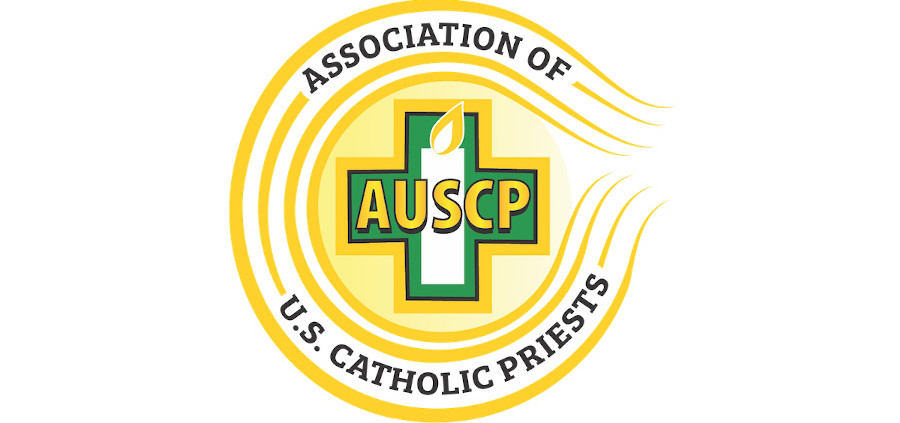A Report from the AUSCP Annual Assembly: Day 1
The 11th annual assembly of the Association of US Catholic Priests (AUSCP) officially got underway on Monday at the Maritime Conference Center in Linthicum, Maryland. The theme for this year’s assembly is “Let Us Dream: The Path to a Better Future.”
The assembly began with a day retreat led by Father Scott Detisch, a priest of the Diocese of Erie. Fr. Detisch is the author of From Hero to Servant to Mystic: Navigating the Deeper Waters of Priestly Spirituality (Liturgical Press, 2019).
In his opening remarks following the retreat, AUSCP leadership team member Fr. Greg Barras invited attendees to focus on “the will to communion” and to “dream how we will get there.” He quoted Kahlil Gibran: “Trust your dreams. They are the gateway to eternity.”
Sr. Michelle Stachowiak, a member of the Congregation of the Sisters of St. Felix of Cantalice (Felician Sisters) and the Associate Director for Mission Collaboration at the Leadership Conference of Women Religious (LCWR), gave an overview of the practice and process of contemplative dialogue. The practice is designed to help attendees reflect, communicate, and discern individually and collectively the essential themes of the assembly presentations.
Sr. Stachowiak spoke of contemplative dialogue as “a means of readying the ground for collective transformation.” She contrasted the insights we might arrive at in solitude with the “shared meaning” that emerges through mutual exchange, or what she termed the “via collectiva.” “We are trying to build what we love,” she said, and “to build what we feel called to build.”
Bishop John Stowe of the Diocese of Lexington in Kentucky was the evening’s keynote speaker. His presentation was “Fratelli Tutti: The Magisterium of Pope Francis and Its Challenge for the U.S. Church.” Bishop Stowe is the president of Pax Christi USA.
Bishop Stowe said that we are called to “create the community that is committed to the common good.” He pointed to the example of Pope Francis, “who exemplifies the mercy of God,” and critiqued a U.S. Catholic Church that “whispers a condemnation of gun violence” and “cannot bring itself to utter the three critical words Black Lives Matter.”
“Our universal fraternity has to be awakened for our own human survival,” he said.
Building on the theme of “political charity” in Fratelli Tutti, Bishop Stowe said that politics is noble when it is in the service of the common good. Populism is a new form of polarization that prefers short-term advantage over taking “the long view,” he said.
Organizing to end poverty is an act of charity, but without “reducing poor people to passivity or becoming ‘projects’ for our help.” We are not meant to ask “who is closest” as our neighbor, but to become “neighbors to all.”
Quoting Pope Francis, he said: “Those who raise walls will end up as slaves within the very walls they have built. They are left without horizons.”
The bishop drew on the example of the Good Samaritan, a parable that figures prominently in Fratelli Tutti. He said that following the model of the Good Samaritan is “the way to rebuild our wounded world.” The Samaritan “had no rights in society,” yet “he was the one who contributed to the common good.”
He linked Pope Francis’s emphasis on the “foreignness” of the Good Samaritan to the need to “welcome, protect, promote, and integrate” immigrants. He reminded listeners of “the reciprocal gifts of immigration” and emphasized the gifts of “gratuitousness” over “efficiency,” stating that the contributions of immigrants do not have to be economic to be of value.
The bishop spoke of “cultivating a penitential memory” within the U.S. church, especially around historical questions of slavery and the treatment of Native American populations. “Authentic reconciliation does not flee from conflict, but is achieved in conflict,” he said.
After the presentation, attendees were given the opportunity to break into small groups for sharing and reflection.
Bishop Stowe responded to questions from the groups. When asked where he finds hope in the U.S. church, he pointed to religious women for the ways they “have set the course” on synodality and discernment.
Asked whether priests should be “more political,” he said that it is important for church leaders to be “in the mix” whenever they can organize for the common good. But he stressed that this should be done in a spirit of encounter that avoids fostering division. “More political, yes,” he said. “More partisan, no.” ♦
Our coverage of the AUSCP assembly will continue throughout the week.





Leave a Reply
Want to join the discussion?Feel free to contribute!